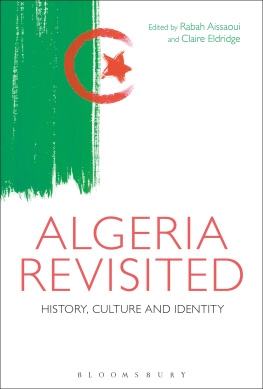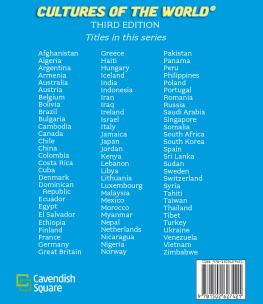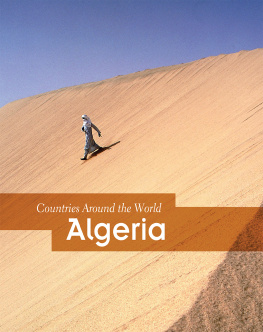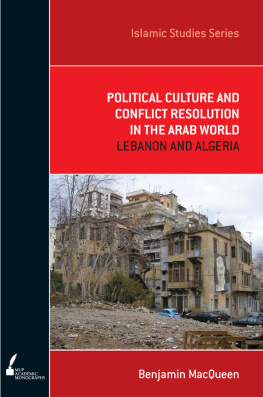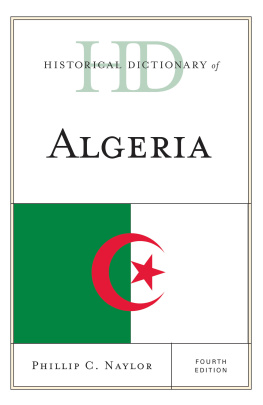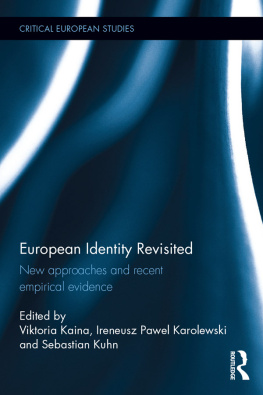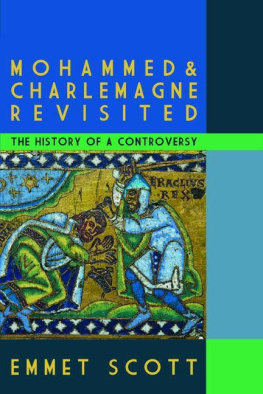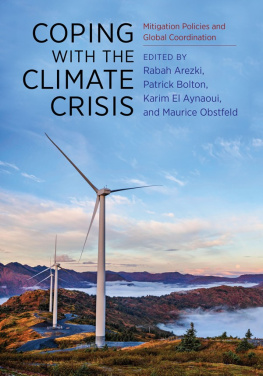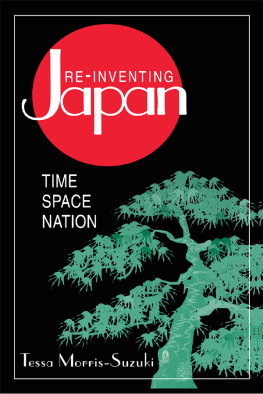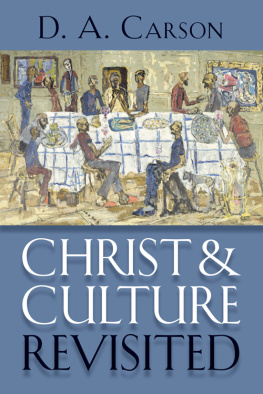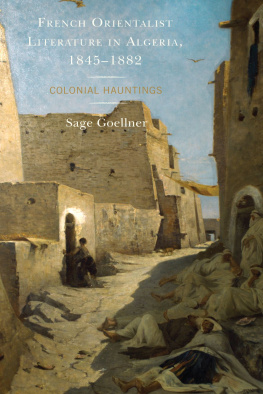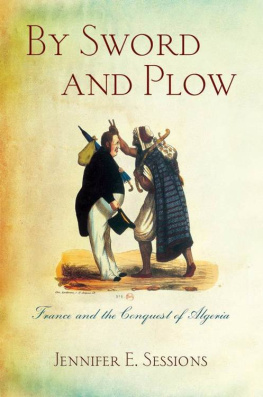Rabah Aissaoui - Algeria Revisited: History, Culture and Identity
Here you can read online Rabah Aissaoui - Algeria Revisited: History, Culture and Identity full text of the book (entire story) in english for free. Download pdf and epub, get meaning, cover and reviews about this ebook. year: 2017, publisher: Bloomsbury Academic, genre: Politics. Description of the work, (preface) as well as reviews are available. Best literature library LitArk.com created for fans of good reading and offers a wide selection of genres:
Romance novel
Science fiction
Adventure
Detective
Science
History
Home and family
Prose
Art
Politics
Computer
Non-fiction
Religion
Business
Children
Humor
Choose a favorite category and find really read worthwhile books. Enjoy immersion in the world of imagination, feel the emotions of the characters or learn something new for yourself, make an fascinating discovery.
- Book:Algeria Revisited: History, Culture and Identity
- Author:
- Publisher:Bloomsbury Academic
- Genre:
- Year:2017
- Rating:5 / 5
- Favourites:Add to favourites
- Your mark:
- 100
- 1
- 2
- 3
- 4
- 5
Algeria Revisited: History, Culture and Identity: summary, description and annotation
We offer to read an annotation, description, summary or preface (depends on what the author of the book "Algeria Revisited: History, Culture and Identity" wrote himself). If you haven't found the necessary information about the book — write in the comments, we will try to find it.
Algeria Revisited: History, Culture and Identity — read online for free the complete book (whole text) full work
Below is the text of the book, divided by pages. System saving the place of the last page read, allows you to conveniently read the book "Algeria Revisited: History, Culture and Identity" online for free, without having to search again every time where you left off. Put a bookmark, and you can go to the page where you finished reading at any time.
Font size:
Interval:
Bookmark:
Revisited

This volume arose out of the Algeria Revisited international conference held in April 2012 at the University of Leicester to mark the fiftieth anniversary of Algerian independence. We would first like to thank all of the delegates whose wide-ranging and thought-provoking contributions made the event so intellectually stimulating and enjoyable. We both learned an enormous amount from the experience and we hope that we have been able to capture some of the energy and variety that we felt were distinctive hallmarks of that conference in this volume. We also want to acknowledge the numerous sponsors whose financial support made the conference possible in a practical sense: The Institut Franais, The Society for the Study of French History, The Society for French Studies, The Association for the Study of Modern and Contemporary France, The Society for Algerian Studies, The Society for Francophone Postcolonial Studies, The Modern Humanities Research Association, The Royal Historical Society, the University of Leicester and the University of Southampton. We are grateful to Claire Lipscomb and her team at Bloomsbury who have been highly supportive of our project and to the anonymous reviewers for their constructive comments. At the copy-editing stage, Thomas Martin proved invaluable to us. Our thanks equally go to Teresa Bridgeman for her fantastic translation of chapter 6, and to Kamlesh Chandarana who produced the map for the volume. Our biggest thanks, however, go to our contributors. During the time it has taken to bring this volume together they have shown enormous patience and good will towards us. For this and for the really excellent quality of their chapters we thank them all. We hope they are as pleased with the end result as we are.
Rabah Aissaoui is a Senior Lecturer in French Studies at the University of Leicester, UK. His research focuses on immigration and racism in colonial and postcolonial France and on colonial identities in Algeria. He researches French colonial history and the relationship between history, memory and ethnic identity. He is the author of Immigration and National identity: North African Political Movements in Colonial and Postcolonial France (2009).
Arthur Asseraf is Examination Fellow in History at All Souls College, Oxford University, UK. His work focuses on foreign news in Algeria in order to examine the relationships between different groups in colonial society and the wider world. He is also interested in the uses of comparison and foreign models in decolonization and in postcolonial France.
Sophie Blot coordinates and lectures on the part-time Degree in French Language and Cultures at the University of Sheffield, UK. She also lectures at the University of Nottingham (UK). Her research and publications centre on philosophical approaches to representations of women in contemporary cinema as well as on forms of cinema, such as documentary, essay film and adaptations. She has also completed a monograph on the director and scriptwriter Catherine Breillat for Rodopi. She is currently developing a project exploring the notion of emotion in French and Francophone cinema, particularly in relation to Jean-Luc Godards Contempt.
Patricia Caill is Associate Professor in the Communication and Information Management Department at the Universit de Strasbourg, France. Her research focuses on Maghrebi cinemas, more particularly the construction of national and regional identities, the work of women filmmakers, and audiences. She has co-edited two Dossiers Africultures on Cinmas du Maghreb et leurs publics (2012) and Circulation des films et rgion MENA (forthcoming). She has published in Diogne, Studies in French Cinema, French Cultural Studies, Interventions and Mise au Point.
Claire Eldridge is a Lecturer in Modern European History at the University of Leeds, UK. Her research focuses on memory and migration in postcolonial France, particularly with respect to the pied-noir and harki communities. She is also interested in the history of military service undertaken by the settler population of Algeria in the nineteenth and early twentieth centuries. She is the author of From Empire to Exile: History and Memory within the Pied-Noir and Harki Communities, 19622012 (2016).
Samira Farhoud specializes in francophone literature of North Africa and the Middle East, and she has published in journals such as Nouvelles Etudes Francophones, Prsence Francophone and French Cultural Studies. Her book Interventions autobiographiques des femmes du Maghreb (2013) explores themes of complexity, hybridity and heterogeneity in the autobiographical je (I/self) of North African and French women.
Samuel Kalman is an Associate Professor of History at St Francis Xavier University in Nova Scotia, Canada. His research interests include the history of fascism in modern France and the French empire, as well as crime and criminal justice in Colonial Algeria. His publications include French Colonial Fascism: The Extreme Right in Algeria, 19191939 (2013) and The Extreme Right in Interwar France: The Faisceau and the Croix de Feu (2008).
James McDougall is a Fellow and Tutor in Modern History at Trinity College, Oxford, UK. He previously taught at Princeton and at SOAS, London. His publications include History and the Culture of Nationalism in Algeria (2006), Saharan Frontiers: Space and Mobility in Northwest Africa (2012) and A History of Algeria (Cambridge University Press, forthcoming). He is currently writing Empire in Fragments, a history of colonialism and its legacies in France and Africa.
Michelle Mann is an advanced doctoral researcher in French Colonial History at Brandeis University, USA, and current pedagogical director of the Brandeis University Writing Centre. Her research explores the interrelated questions of citizenship, culture and national identity in France and North Africa. Her forthcoming work focuses particularly on the relationship between colonial conscription in the First World War and the emergence of anti-colonial nationalism in Algeria.
Jennifer E. Sessions is an Associate Professor of History at the University of Iowa, USA. Her research focuses on colonialism and colonial cultures in modern France. She is especially interested in the history of French settler colonialism in Algeria during the nineteenth century. She is the author of By Sword and Plow: France and the Conquest of Algeria (2011).
Blandine Valforts research focuses on literature from the Maghreb and Mashriq regions with a particular interest in poetry. She holds a PhD in Francophone literature from the Universit Lumire Lyon 2. Her thesis, Lyricisme in the Face of Events: A Comparative Study of Francophone Poetry from the Maghreb and the Mashriq (Algeria, Lebanon, 19501990), was successfully defended in 2013. More broadly, she is interested in the relationship between history, literature and cultural identities during the colonial and postcolonial periods. She is the editor, with Elena Chiti and Touriya ili-Tullon, of Writing the Unexpected. The Arab Spring between Fiction and History (2015).
Carey Watt is Professor of History at St Thomas University in Fredericton, New Brunswick, Canada, where he teaches and researches world history and the history of South Asia in the late colonial era. He has also contributed to the field of postcolonial francophone literature with Samira Farhoud. In 2010 they co-wrote an article entitled Punk Beur in
Font size:
Interval:
Bookmark:
Similar books «Algeria Revisited: History, Culture and Identity»
Look at similar books to Algeria Revisited: History, Culture and Identity. We have selected literature similar in name and meaning in the hope of providing readers with more options to find new, interesting, not yet read works.
Discussion, reviews of the book Algeria Revisited: History, Culture and Identity and just readers' own opinions. Leave your comments, write what you think about the work, its meaning or the main characters. Specify what exactly you liked and what you didn't like, and why you think so.

